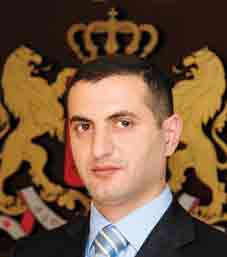War Commission questions Vashadze and Kezerashvili
By Mzia Kupunia
Friday, November 28

The Commission decided to hear Vashadze after questioning ex-Ambassador to Russia Erosi Kitsmarishvili on November 25, who among other things said that Vashadze was present when the President said he was planning to move the capital of Georgia from Tbilisi to Sokhumi. Vashadze denied this, saying that the Georgian President had never talked about moving the capital to Sokhumi. He also denied the further allegation that the head of the Russian President’s administration, Narishkin, came to Tbilisi to prepare the ground for a meeting between Saakashvili and Medvedev. Vashadze said Narishkin’s visit to Tbilisi was not about preparing any meetings between the Presidents. “Narishkin wanted to see what the situation was in Georgia and work out the attitudes of Georgians,” Vashadze said.
Vashadze confirmed the statements of those who had previously testified that the Georgian Government and, in particular, the Foreign Ministry of Georgia, had been doing its best to regulate relations with Russia. “We had been instructed by the President to find all possible means of improving relations between Russia and Georgia, however all our attempts failed,” Vashadze told the Commission. “The tragedy is that for Russia, the idea of an independent, democratic and united Georgia is absolutely unacceptable, because Russia needs Georgia to be an unstable place. Thus all our attempts to regulate relations were predestined to fail,” Vashadze said.
Defence Minister David Kezerashvili was the second to be questioned by the Commission yesterday. He told the MPs that the August war was a defeat in terms of a concrete battle, however, the Minister said, generally the August events cannot be considered Russia’s victory. “If we take into account what Russia wanted and what it was able to achieve, we can say that for Russia the August war was a defeat. Georgia has maintained its administration, it has maintained its economy and its territories, except some parts of the country,” Kezerashvili said.
He confirmed that he asked permission from the Georgian President to open fire in the direction of the place from which Georgian villages were being shelled. Kezerashvili said it was impossible to “sit and wait” because civilians were facing danger, as Russian troops were entering South Ossetia via the Roki Tunnel. The Defence Minister acknowledged that some problems emerged during the military actions, in particular that reservists had failed to be effective during the war. Kezerashvili stated that the confused and wrong management of reservists during the conflict was caused by a lack of sufficient numbers of officers who could guide inexperienced staff.
Kezerashvili was asked about the plan of retreat of Georgian troops from Tskhinvali. Kezerashvili said it was a planned retreat and not “merely running away.” He told the Commission that the decision to withdraw from Tskhinvali was taken because of the quantity of troops and equipment entering South Ossetia via the Roki tunnel. The Minister also pointed out there were networking problems, saying that there were some shortcomings at “high level” and not “brigade level.” He confirmed that some commands were given over mobile phones, but denied the allegations that 80% of all orders were given using the cell phones.
The MPs asked the Defence Minister about alleged indiscriminate shooting in Tskhinvali by the Georgian forces. Kezerashvili said it was hard to differentiate between civilians and militants there, because most of the men remaining in Tskhinvali were armed. Kezerashvili said civilians in Tskhinvali were given a chance to leave the town during a 3 hour ceasefire declared by the Georgian side. Kezerashvili said some civilians had left during these 3 hours.
The Defence Minister ruled out the involvement of any foreign instructors in the military actions in August, as well as denying the statements of former Ambassador to Russia Erosi Kitsmarishvili that Georgia had been given a “green light” from the US administration to start an attack on South Ossetia. “The Georgian Security Council made the relevant decision without any directives from outside,” Kezerashvili told the MPs. Kezerashvili also commented on the evacuation of the Defence Ministry Building in August. He said the decision was made by the head of the Security Service of the Ministry and not by the officials. The Defence Ministry staff were evacuated to the Marjanishvili metro station, causing panic in the population. The MPs asked if the building had a basement, however the Minister said he would answer this question in the behind-closed-doors part of the hearing. He also promised to talk about the losses the Ministry suffered in August behind closed doors.
The Temporary Parliamentary Commission, which has already questioned a number of high ranking figures, will hear the President of Georgia today.
